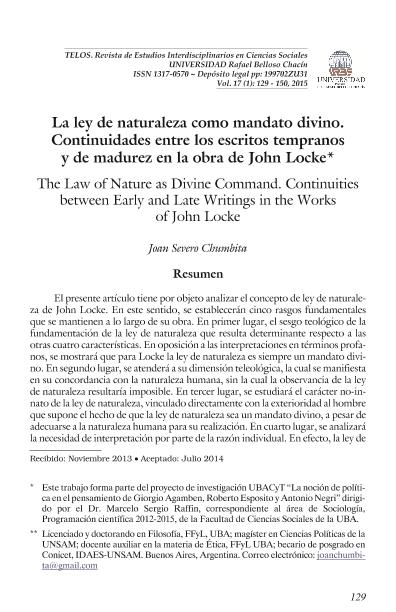Artículo
El presente artículo tiene por objeto analizar el concepto de ley de la naturaleza de John Locke. En este sentido, se establecerán cinco rasgos fundamentales que se mantienen a lo largo de su obra. En primer lugar, el sesgo teológico de la fundamentación de la ley de la naturaleza que resulta determinante respecto a las otras cuatro características. En oposición a las interpretaciones en términos profanos, se mostrará que para Locke la ley de la naturaleza es siempre un mandato divino. En segundo lugar, se atenderá a su dimensión teleológica, la cual se manifiesta en su concordancia con la naturaleza humana, sin la cual la observancia de la ley de la naturaleza resultaría imposible. En tercer lugar, se estudiará el carácter no-innato de la ley de la naturaleza, vinculado directamente con la exterioridad al hombre que supone el hecho de que la ley de la naturaleza sea un mandato divino, a pesar de adecuarse a la naturaleza humana para su realización. En cuarto lugar, se analizará la necesidad de interpretación por parte de la razón individual. En efecto, la ley de la naturaleza, en tanto mandato divino no-innato, exige una demostración pues no hay de ella una captación racional inmediata. Por último, se abordará el lugar que ocupa la ley de la naturaleza frente al derecho positivo. En este sentido, tanto el carácter externo, concordante con la naturaleza humana, no-innato e interpretable por parte de la razón individual, habilitan que la ley de la naturaleza sirva de crítica a todo derecho positivo. De este modo, estos cinco elementos, articulados en el orden propuesto, permiten comprender el status epistemológico y la función práctica del concepto de ley de la naturaleza, fundamentales, como es sabido, a la concepción lockeana de la propiedad, el Estado y la resistencia. This article analyzes John Locke´s law of nature. Five defining features will be established and sustained throughout the examination of his works. First, the theological bias of the law of nature´s foundation, which is determining for the other four features. In opposition to atheological interpretations, it will be shown that, according to Locke, the law of nature is always a divine command. Second, its teleological dimension will be analyzed, manifested in its accord with human nature, without which observing the law of nature would be impossible. Third is the non-innate character of the law of nature linked directly to man´s externality, which supposes the fact that the law of nature is a divine command, even though it has to accommodate to human nature for its realization. Fourth, the need for interpretation by individual reason will be analyzed. Indeed, the law of nature, as a non-innate divine command, demands a demonstration because it is not immediately perceived by reason. Finally, the position of the law of nature in relation to positive law will be approached. In this sense, both the external character which concords with human nature, non-innate and interpretable by individual reason, allows the law of nature to act as a critic of all positive law. Thus, these five elements, articulated in the proposed order, allow us to understand the epistemological status and the practical function of the law of nature, essential, as is known, to the Lockean view on property, the State and resistance.
La ley de la naturaleza como mandato divino: Continuidades entre los escritos tempranos y de madurez en la obra de John Locke
Título:
The Law of Nature as Divine Command: Continuities between Early and Late Writings in the Works of John Locke
Fecha de publicación:
01/2015
Editorial:
Universidad Rafael Belloso Chacín
Revista:
Telos
ISSN:
1317-0570
Idioma:
Español
Tipo de recurso:
Artículo publicado
Clasificación temática:
Resumen
Palabras clave:
LOCKE
,
LEY DE LA NATURALEZA
,
TEOLOGÍA
,
NATURALEZA HUMANA - OBLIGACIÓN MORAL
Archivos asociados
Licencia
Identificadores
Colecciones
Articulos(SEDE CENTRAL)
Articulos de SEDE CENTRAL
Articulos de SEDE CENTRAL
Citación
Chumbita y Gamba, Joan Severo; La ley de la naturaleza como mandato divino: Continuidades entre los escritos tempranos y de madurez en la obra de John Locke; Universidad Rafael Belloso Chacín; Telos; 17; 1; 1-2015; 129-150
Compartir




